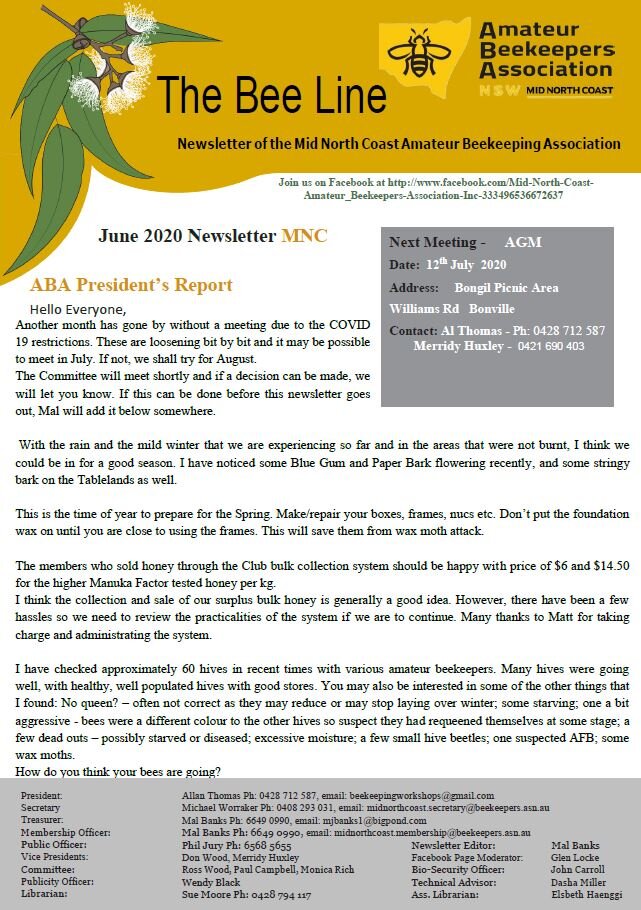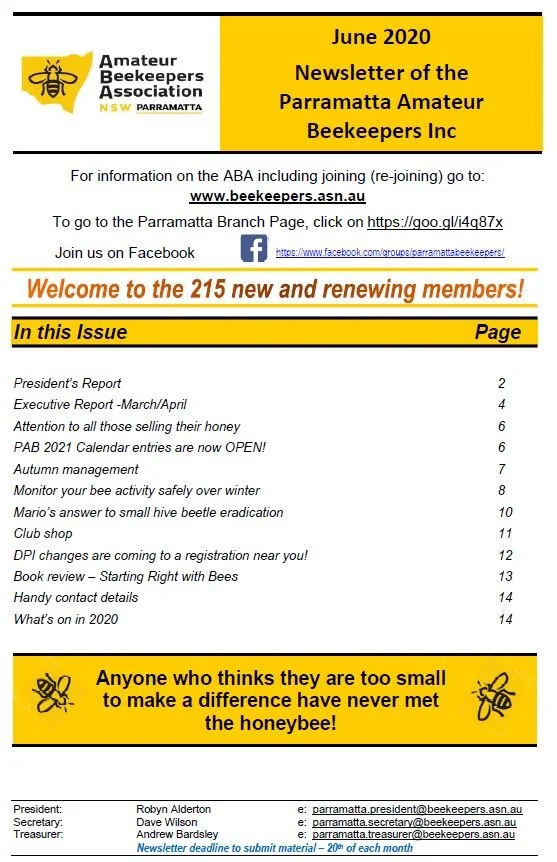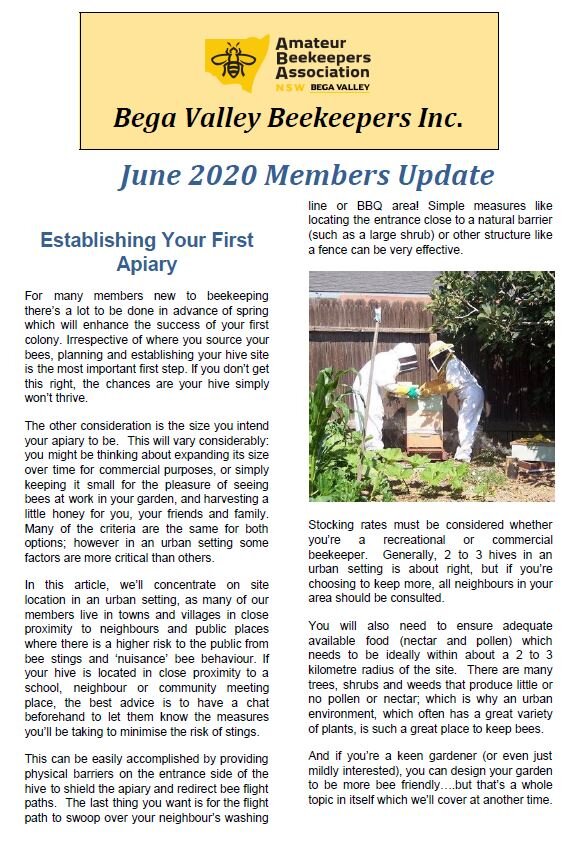Our new ant resistant hive stands were installed at the apiary on Tuesday, June 23rd. Made from strong and sturdy, corrosion-resistant stainless steel, the centre upright of each stand has a small reservoir which is filled with cooking oil. Not only do the stands elevate the hives for easier access, the oil reservoir prevents ants from climbing up the stand and entering the hive.
Parramatta newsletter - July 2020
In this issue:
President’s Report
Executive Report - March/April
Attention to all those selling their honey
PAB 2021 Calendar entries are still OPEN!
When to extract honey
Q&A
Could our hives at James Ruse have American Foul Brood (AFB)?
In the media
The Bee Hive Store, Taree
You too could plant a ‘flower meadow’
‘My Bee experience’ or maybe ‘My b….. inexperience’
Brood theft!
Club shop
Handy contact details
What’s on in 2020
Mid North Coast newsletter - June 2020
Far North Coast newsletter - June 2020
Note from Editor: Date for field day is July 19th . Training days are July 25th & Aug. 31st
Manning Valley newsletter - June 2020
Northern Rivers newsletter - June 2020
As I have said many times Red Gum and Grey Ironbark make a great pair. Red Gum has great pollen and seldom any nectar, and Grey Ironbark has no pollen but is a major honey tree. Both these trees are quite variable as to flowering time, starting any time from May until August. They both last about three months, tend to grow together, and are wide spread.
Parramatta newsletter - June 2020
The Amateur Beekeeper - June/July 2020
In this issue:
ABA activities: an update
Short film contest winners
Code of Practice for beekeepers
Get ready for the new rules – Try our online quiz. Win a prize
Artificial comb. A better solution or a bigger problem?
Bruce White reports
And a real life test with some very unexpected results
Here’s how bees hang together to construct their comb
Getting creative with hive decoration
Virtual conference tickets
European Foulbrood: a myth, and the facts on how to treat it
Step-by-step guide to building and painting bee boxes to make them last
When the diagnosis is American Foulbrood: the safe and correct way to deal with the aftermath
Membership FAQs
ABA team and contacts
Bega Valley newsletter - June 2020
Bega Valley - World Bee Day press release
Celebrating World Bee Day 2020 in the Bega Valley
“Celebrating World Bee Day this year has taken on a whole new significance to the entire community, in light of the devastating, combined impact of years of drought and recent bushfires” said Fay Steward, President of the Bega Valley Beekeepers Association.
Thousands of hectares of native forest essential to the survival of native wildlife and the beekeeping industry have been lost, and according to the NSW Apiarist Association, this could lower honey production in NSW by about 30% for at least the next 10 years.
Many hives were destroyed by fire in our region, and this, combined with the resulting loss of forested areas, which normally provide good nectar and pollen sources, is a major concern to the beekeeping industry and primary industry producers, who rely on bees for pollination.
“The economic impact may be substantial” she said “with estimates of around $36 million being contributed annually to the NSW economy through the production of honey and hive related products”.
World Bee Day is a timely reminder of the importance of bees in making life possible for humans. They pollinate crops, and are thought to be responsible for one in three of every spoonsful of food we eat. Even more important is the essential role bees play in balancing our ecosystems; and it is alarming that bee species are declining world-wide.
The expression “think globally - act locally” has never been more important, and the Bega Valley Beekeepers Association has encouraged members to dig another bee loving plant into the garden, or give one as a gift on Wednesday 20 th May, which is the United Nations designated World Bee Day.
Bega High School, which established an apiary 2 years ago, is doing just that. Their aim is to encourage awareness of the importance of pollinators, such as bees, the threats they face and their contribution to sustainable development. The school also boasts a magnificent bee themed mural painted by students when the apiary was established.
Fay said people wishing to get started in beekeeping are welcome to contact the club to find out how they can get started. “Backyard beekeeping is becoming increasingly more popular world-wide, so it’s really important that people learn how they can manage their hives for good health, and in a way that doesn’t cause concern to their neighbours and visitors” she said.
For more information about the club contact the secretary at begavalley.secretary@beekeepers.asn.au .






